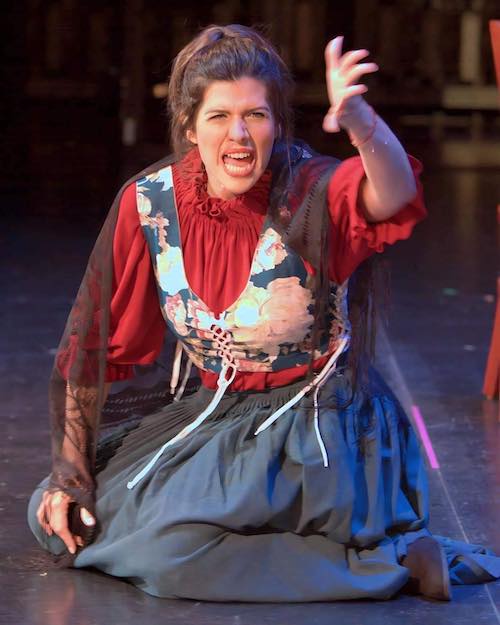Thrilling Mascagni tops Miami Lyric Opera’s mixed double bill

Nathalie Avila was Santuzza in Miami Lyric Opera’s production of Mascagni’s Cavalleria Rusticana. Photo: Howard Hahn
Verismo was an operatic movement in the late 19th and early 20th century that moved the art form away from costume dramas to present more realistic and naturalistic stories. Likewise, the music of verismo composers was more intense and declamatory, though often lyrical. The last remnants of bel canto were abolished.
Miami Lyric Opera presented a verismo double bill on Sunday afternoon at the Moss Cultural Center in Cutler Bay spotlighting two of the leading composers of this operatic genre: Pietro Mascagni and Giacomo Puccini.
Mascagni’s Cavalleria Rusticana is one of the most popular verismo operas. A tale of betrayal and revenge filled with unforgettable melodies, Cavalleria demands three first-class voices in the leading roles and two solid supporting singers. Raffaele Cardone’s production met that challenge.
As the distraught Santuzza who has been seduced by the reckless former soldier Turiddu, Nathalie Avila brought a large, penetrating soprano with emotional intensity to burn. She captured the pregnant heroine’s desperation in a feverish rendition of “Voi lo sapete.” Her multi-hued instrument blended winningly with the Turiddu of Italian tenor Alessio Borraggine. When he spurned her, she hurled Santuzza’s curse with chilling venom.
Borraggine was the production’s real discovery. With a robust voice that can ring through the house, he brought passion yet a welcome touch of subtlety to the irresponsible anti-hero who has been having an affair with Lola, the wife of the local Sicilian carter Alfio. Turiddu’s drinking song was rendered with suavity rather than loudly propounded and he registered pathos as well as anger in his confrontation with Alfio. Borraggine’s traversal of Turiddu’s farewell to his mother, Mamma Lucia, was heartrending. Borraggine is an artist of major-league potential.
Nelson Martinez’s big, burly baritone captured the ruffian Alfio’s toughness and fury. His initial aria was delivered with vociferous fervor. In the vengeance duet, after Santuzza has informed Alfio of Turiddu’s affair with his wife, Avila and Martinez put across vocal fire, pulling out all the stops.
Lauren Frick’s stoical demeanor and warmly colored mezzo made Mamma Lucia’s lines register. Raquel Rubi brought attractive stage presence and an appealing light mezzo to Lola’s brief scene.
Except for some stilted blocking of the chorus, Cardone’s staging kept the drama and the protagonists’ volatility front and center. Leo Walz paced the score effectively and drew fine playing from the orchestra, especially in the Intermezzo which was replete with soaring string tone. The chorus acquitted itself especially well in the Easter hymn.
Suor Angelica is the centerpiece of Puccini’s “Il Trittico,” of three one-act operas. The story of a woman from a wealthy family who has been placed in a convent after having a child out of wedlock can be a showpiece for a gifted lyrico-spinto soprano. In the opera’s final scene, as the heroine commits suicide after learning that her child has died, Puccini’s innate lyricism takes full wing.
Suor Angelica can be a deeply moving musico-dramatic experience. On this occasion, it missed that mark for the lack of a heroine who can sing Puccini’s voluptuous writing with ease and command the stage. Marinel Cruz has a potentially fine voice but her registers are uneven, her lower voice sounded foggy and her portrayal of the nun was too low-key until the final scene. The aria “Senza mamma” passed by without setting off sparks. When she went into the upper register, one could hear that, with proper work and coaching, Cruz could be a real Puccini soprano. She assayed the death scene well where Puccini’s music lay in her voice’s strong top.
Katiuska Rodriguez brought a voluminous dramatic mezzo and haughty demeanor to Angelica’s cruel princess aunt. Her coldness and snobbery when the aunt informs the heroine of her son’s death registered with impact. Frick as the Abyss, Rubi as the Monitress and Elizabeth DiFronzo as the Mistress of Novices stood out in the well-coordinated and vocally solid chorus of nuns.
Beverly Coulter evidenced real affinity for Puccini’s soaring lines, drawing fine playing from the ensemble. She aptly highlighted Puccini’s orchestral inventiveness like the poison scene.
The sets from the Stivanello-Sormani company highlighted a backdrop of an impressive church with a large cross and a statue of the Virgin on stage. Cardone’s production was admirably spare, emphasizing the nuns’ spartan life.
In the finale, the heroine prays for forgiveness and sees a vision of the Virgin with her son as she dies. Is this a miracle or the poison working on Angelica’s mind? However one views the ending, Cardone’s final tableaux of the Virgin Mary with Angelica’s son was striking and clearly had deep meaning for many audience members.
Posted in Performances
Leave a Comment
Mon Nov 6, 2023
at 1:43 pm
No Comments




